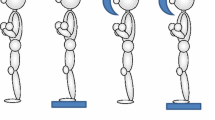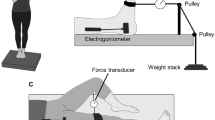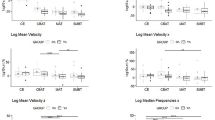Abstract
The changes in postural control in elderly people after an 8-week training course were characterized. Static postural stability was measured during standing on a single force platform first with the eyes open and then with the eyes closed. Body sway was analysed on a force plate in groups of elderly and of young subjects. Half of the elderly subjects then took part in the training course. The posturographic measurements were repeated after the course. The sway in anteroposterior (AP) and mediolateral (ML) directions was subjected to spectral analysis. The frequency spectrum of the platform oscillations was calculated by fast Fourier transformation in the intervals 0.1–0.3, 0.3–1 and 1–3 Hz. It was found that the sway path was longer and the frequency power was higher in the elderly group. The training caused a significant improvement in functional performance, but a significantly longer sway path was observed after the training in the ML direction. The frequency analysis revealed a significantly higher power after 8 weeks without visual control in the ML direction in the training group in the low and the middle frequency bands. The results suggest that the participants’ balance confidence and the control of ML balance improved in response to the training. The higher ML frequency power exhibited after the training may be indicative of a better balance performance. Thus, the increase in the sway path in this age group did not mean a further impairment of the postural control.



Similar content being viewed by others
References
Amiridis IG, Hatzitaki V, Arabatzi F (2003) Age-induced modifications of static postural control in humans. Neurosci Lett 350:137–140
Brooke-Wavell K, Perret LK, Howarth PA, Haslam RA (2002) Influence of the visual environment on the postural stability in healthy older women. Gerontology 48:293–297
Brown M, Sinacore DR, Host HH (1995) The relationship of strength to function in the older adult. J Gerontol A Biol Sci Med Sci 50 A(Spec number):55–59
Buchner DM, Beresford SA, Larson EB, LaCroix AZ, Wagner EH (1992) Effects of physical activity on health status in older adults. II. Intervention studies. Annu Rev Public Health 13:469–488
Bugnariu N, Sveistrup H (2006) Age-related changes in postural responses to externally- and self-triggered continuous perturbations. Arch Gerontol Geriatr 42:73–89
Campbell AJ, Borri MJ, Spears GF (1989) Risk factors for falls in a community-based prospective study of people 70 years and older. J Gerontol A Biol Sci Med Sci 44:112–117
Carpenter MG, Frank JS, Silcher CP (1999) Surface height effects on postural control: a hypothesis for a stiffness strategy for stance. J Vestib Res 9:277–286
Carpenter MG, Frank JS, Silcher CP, Peysar GW (2001) The influence of postural threat on the control of upright stance. Exp Brain Res 138:210–218
Collins JJ, De Luca CJ, Burrows A, Lipsitz LA (1995) Age-related changes in open-loop and closed-loop postural control mechanisms. Exp Brain Res 104:480–492
De Luca CJ, LeFever LS, McCue MP, Xenakis LA (1982) Control scheme governing concurrently active human motor units during voluntary contractions. J Physiol (Lond) 329:129–142
Fujita T, Nakamura S, Ohue M, Fujii Y, Miyauchi A, Takagi Y, Tsugeno H (2005) Effect of age on body sway assessed by computerised posturography. J Bone Miner Metab 23:152–156
Galganski ME, Fuglewand AJ, Enoka RM (1993) Reduced control of motor output in a human hand muscle of elderly subjects during submaximal contractions. J Neurophysiol 69:2108–2115
Golomer E, Cremieux J, Dupui P, Isableu B, Ohlmann T (1999) Visual contribution to self-induced body sway frequencies and visual perception of male professional dancers. Neurosci Lett 267:189–192
Henry SM, Fung J, Horak FB (1998) Control of stance during lateral and anterior/posterior surface translations. IEEE Trans Rehabil Eng 6:32–42
Horak FB (1997) Clinical assessment of balance disorders. Gait Posture 6:76–84
Hue OA, Seynnes O, Ledrole D, Colson SS, Bernard PL (2004) Effects of a physical activity program on postural stability in older people. Aging Clin Exp Res 16:356–362
Judge JO (2003) Balance training to maintain mobility and prevent disability. Am J Prev Med 25:150–156
Judge JO, Lindsey C, Underwood M, Winsemius D (1993) Balance improvements in older women: effects of exercise training. Phys Ther 73:254–262
Judge JO, Whiple RH, Wolfson LI (1994) Effects of resistive and balance exercises on isokinetic strength in older persons. J Am Geriatr Soc 42:937–946
Krafczyk S, Schlamp V, Dietrich M, Haberhauer P, Brandt T (1999) Increased body sway at 3.5–8 Hz in patients with phobic postural vertigo. Neurosci Lett 259:149–152
Laughton CA, Slavin M, Katdare K, Nolan L, Bean JF, Kerrigan DC, Phillips E, Lipsitz LA, Collins J (2003) Aging muscle activity, and balance control: physiologic changes associated with balance impairment. Gait Posture 18:101–108
Lord SR, Ward JA, Williams P, Anstey K (1994) Physiological factors associated with falls in older community-dwelling women. J Am Geriatr Soc 42:1110–1117
Maki BE, McIlroy WE (1996) Postural control in the older adult. Clin Geriatr Med 12:635–658
Maki BE, McIlroy WE (1997) The role of limb movements in maintaining upright stance: the “change-in-support” strategy. Phys Ther 77:488–507
Maki BE, Holliday PJ, Topper AK (1991) Fear of falling and postural performance in elderly. J Gerontol 46:M123–M131
Maki BE, Holliday PJ, Topper AK (1994) A prospective study of postural balance and risk of falling in an ambulatory and independent elderly population. J Gerontol Med Sci 49:M72–M84
Manchester D, Wollacott M, Zederbauer-hylton N, Marin O (1989) Visual, vestibular and somatosensory contributions to balance control in older adult. J Gerontol Med Sci 44:M118–M127
Mazzeo RS, Cavanagh P, Evans WJ, Fiatarone M, Hagberg J, McAuley E, Startzell J (1998) ACSM position stand on exercise and physical activity for older adults. Med Sci Sports Exerc 30:992–1008
McCleanaghan BA, Williams HG, Dickerson J, Dwoda M, Thombs L, Eleazer P (1995) Spectral characteristics of aging postural control. Gait Posture 3:123–131
Mitchell SL, Collins JJ, De Luca CJ, Burrows A, Lipsitz LA (1995) Open-loop and closed-loop postural control mechanisms in Parkinson’s disease: increased mediolateral activity during quiet standing. Neurosci Lett 197:133–136
Loram ID, Lakie M (2002) Human balancing of an inverted pendulum: position control by small, ballistic-like throw and catch movements. J Physiol 540:1111–1124
Nagy E, Toth K, Janositz G, Kovacs G, Feher-Kiss A, Angyan L, Horvath G (2004) Postural control in athletes participating in an ironman triathlon. Eur J Appl Physiol 92:407–413
Nashner L, McCollum G (1985) The organisation of human postural movements: a formal basis and experimental synthesis. Behav Brain Sci 8:135–172
Onambele GL, Narici MV, Maganaris CN (2006) Calf muscle-tendon properties and postural balance in old age. J Appl Physiol 100:2048–2056
Schmidt RA (1975) A schema theory of discrete motor skill learning. Psychol Rev 82:225–260
Sheldon JH (1963) The effect of age on the control of sway. Gerontol Clin (Basel) 5:129–138
Soames RW, Atha J (1982) The spectral characteristics of postural sway behaviour. Eur J Appl Physiol Occup Physiol 49:169–177
Whiple RH, Wolfson RI, Amerman PM (1987) The relationship of knee and ankle weakness to falls in nursing home residents: an isokinetic study. J Am Geriatr Soc 35:13–20
Williams HG, McCleanaghan BA, Dickerson J (1997) Spectral characteristic of postural control in elderly individuals. Arch Phys Med Rehabil 78:737–744
Winter DA, Prince F, Frank JS, Powell C, Zabjek KF (1996) Unified theory regarding A-P and M-L balance in quiet stance. J Neurophysiol 75:2334–2343
Wolfson R, Judge J, Whipple R, King M (2005) Strength is a major factor in balance, gait, and the occurrence of falls. J Gerontol A Biol Sci Med Sci 50A:64–67
Yarasheski KE (2003) Exercise, aging, and muscle protein metabolism. J Gerontol 58 A:918–922
Acknowledgments
The authors are grateful to D. Durham for linguistic correction of the manuscript. We declare that the experiments reported on in this paper fully comply with all of the current Hungarian laws and regulations.
Author information
Authors and Affiliations
Corresponding author
Rights and permissions
About this article
Cite this article
Nagy, E., Feher-Kiss, A., Barnai, M. et al. Postural control in elderly subjects participating in balance training. Eur J Appl Physiol 100, 97–104 (2007). https://doi.org/10.1007/s00421-007-0407-x
Accepted:
Published:
Issue Date:
DOI: https://doi.org/10.1007/s00421-007-0407-x




